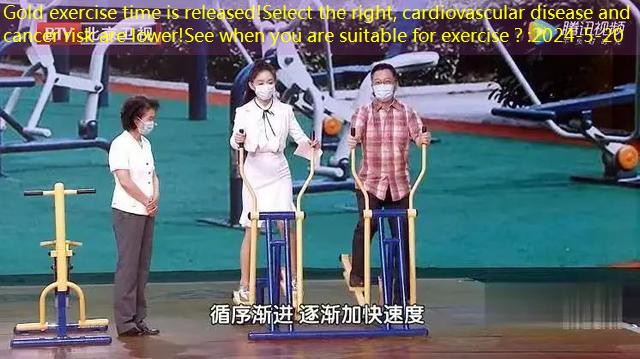We all know that exercise is “the best anti -disease medicine” -E moderate exercise, which can maintain normal tension of muscles, promote the storage of calcium in the bones, and prevent osteoporosis; it can enhance heart function and increase lung capacity; it can promote the digestive systemImprovement; can improve the working ability of brain cells and prevent dementia …

However, due to the differences between living habits and work rhythms, different people will choose different time to exercise.Some people like to run in the morning and turn on a full day; someone is used to going to the gym at night to tie iron or punch, release a day of pressure, unload the exhaustion …
As long as it moves, it is good, but the health benefits brought by the morning and evening exercise are actually very different. Is it better to exercise in the morning or night?
1
Morning exercise
Cardiovascular disease and cancer risk decrease
1 Cardiovascular disease risk is reduced
Recently, one of the large-scale forward-looking queues of over 86,000 people in “European Journal of Preventive Cardiology” shows that no matter the total amount of daily physical activity, the morning exercise (around 8-10 in the morning) and the lowestCoronary heart disease is related to stroke risks, and “health -cost performance” is higher!

(The picture comes from the screenshot of the network)
The researchers divided the participants into four groups according to the “Peak Movement Time”: early morning (8:00), morning (10:00), noon and evening (19:00), and at noon as the control group.
The results show that:
① Within 24 hours, exercise between 8: 00-10: 00 in the morning is related to the lowest risk of heart disease and stroke.
② Compared with the control group, the most active participants in 8: 00 and 10:00, the risk of coronary disease diseases has reduced 11%and 16%, respectively;%.
③ This result is particularly prominent among women: Compared with the control group, the most active women in 8: 00 and 10:00, the risk of coronary artery disease is reduced by 22%and 24%, respectively.35%.
2 Prevent breast cancer and prostate cancer
A study recently conducted by Spain and Austrian scholars shows that morning exercise is the best way to prevent breast cancer and prostate cancer.
Specifically: At 8-10 in the morning, the risk of the incidence of prostate cancer is 26%, which is related to the risk of breast cancer by 27%.

(The picture comes from the screenshot of the network)
2
Sports during the evening
Not only sleeping, sugar control, but also hungry
Sports at 7 to 9 pm in the evening, help sleep and resist hungry
A study published by the top scientific journal of Switzerland Switzerland shows that the appropriate amount of exercise at night will basically not have a negative impact on sleep, and it will also improve sleep.
Research interpretation: Researchers have found that testers who exercise pattern or bicycle cycling before going to bed for a few nights in a row, they have a 21.2%sleep time in deep sleep; if they do not exercise one night, deep sleep will dropTo 19.9%.

(The picture comes from the screenshot of the network)
What are the most suitable exercises in the evening?
The University of Charles Seta in Australia did an experiment and found that the exercise at 7 to 9 pm not only had no adverse effects on sleep, but also the concentration of hunger and hunger in testers was lower.
2 Help improve blood sugar levels
The latest research published by the official journal of the European Diabetes Research Association shows that if the “night owls” used to sleeping late, if they choose to exercise in the afternoon or evening, the risk of type 2 diabetes has a significant decrease in the risk of disease.
Researchers recruited 775 45 ~ 65-year-old adults as research objects, divided into 3 groups, respectively from 6: 00-12: 00 am, 12: 00-18: 00 pm, from 18: 00-24: 00 in the evening.Exercise, including fast walking, jogging or cycling.
Experimental results: After 4 consecutive days of continuous monitoring, the researchers found that compared with those who exercised in the morning, the insulin resistance of the exercise in the afternoon and evening was reduced by 18%and 25%, respectively.In other words, exercise in the afternoon or evening can make insulin better play, thereby improving the level of blood sugar control.
Researchers speculate that the metabolic ability of muscle strength and skeletal muscle cells reaches its peak in the evening in the evening, which may bring more obvious metabolic reactions.

(The picture comes from the screenshot of the network)
It should be noted that you can do some low -intensity exercise 1 hour after meals.This will not affect digestion and avoid blood sugar fluctuations after meals.
3
There is a set of skills in morning and evening exercise
Precautions for morning exercise 1 Give your belly to the bottom
It is best not to completely empty the empty stomach before morning exercise. You can drink water, eat a little bread, biscuits, etc. to supplement energy and prevent hypoglycemia.
But you can’t eat too much, and you should not exercise just after eating it, so as not to affect digestion.

2 Avoid excessive blind persistence
Some people persist in morning training every day, and even their bodies are uncomfortable.
In fact, when the body is unwell, such as a cold, fever, is in the rapid stage of disease or the disease period, people should avoid morning exercise; people who have poor sleep the previous day are also recommended to suspend morning exercises; when the weather is too cold, especially the elderly and weak people, the temperature of the body temperaturePoor regulatory ability, cold and easy disease, it is best to change the exercise time and venue.
3 Be sure to warm up before exercise
The morning is the lowest temperature in the morning, and it has just been sober from sleep. The physical function has not reached a good operating state. If it is rash, it is likely to cause the body to be unable to adapt and cause exercise damage.
Therefore, more than 10 minutes of warm -up exercise and muscle stretching can be performed before exercise.

4 Avoid long -term single project exercise
Repeating a single exercise for a long time will keep some parts in a state of tension and easy to strain, but other parts will not be fully exercised.It is recommended to do two or more exercise in the morning exercise, and the practice of arranging forces, coordination, flexibility and other exercises.
According to their own health, the elderly should reasonably choose a soft movement of exercise, such as jogging, walking, playing Tai Chi, jumping square dance, etc. The lowest intensity and slow exercise are the safest.

Ill Movement Guide 1 Proper high -strength exercise appropriately
In the evening, people have higher body temperature and the best muscle elasticity.
After early and Chinese food nutritional intake, the body’s muscles and tissues are repaired, and sufficient energy can be consumed. Therefore, the exercise results are not easy to hurt. It can do high -strength exercise, such as heavy training and high -strength intermittent exercise.

2 Do not exercise 1 hour before going to bed
Doing some low -intensity exercises at night will help sleep.However, high -intensity exercise before bed can activate the sympathetic nerve, leading to dyslexia.
In order to prevent insomnia after exercise, you can do righteous thoughts, meditation or sitting training after exercise to relax emotions and body.
3 Master a reasonable intensity
Excessive exercise intensity may cause increased blood pressure, accelerated heart rate, myocardial ischemia, hypoxia, and physical strength.Therefore, learn to master reasonable exercise intensity.
For ordinary people, the maximum heart rate of men is “220-age”, the maximum heart rate of women is “210-age”, and the sports safety warning line is 75%of the maximum heart rate.

For those who are too old or have chronic diseases, it is best to determine whether the strength of the exercise is appropriate based on their own feelings:
*If you are comfortable, happy, full of energy, and good sleep after exercise, explain moderate strength;
*If you feel very tired after exercise, you still have fatigue after one night of rest, and have symptoms such as dizziness, panic, nausea, loss of appetite, weak limbs, poor sleep, etc., indicating that the amount of exercise is too large.
There is no best standard for exercise. You can do it according to your personal circumstances, and you can do your best.






















